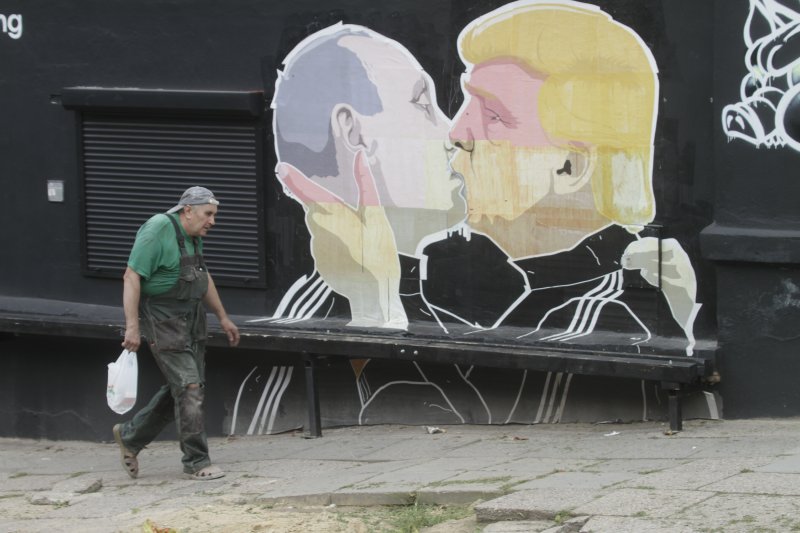Where much of the world has received news of Donald Trump's election victory with shock, Russia has been quick to congratulate the president-elect. Moscow's motives for doing so predate the tycoon's decision to enter politics – perhaps by as much as two decades.
Their roots lie in the question: Who won the Cold War? After the fall of the Berlin Wall, and the subsequent collapse of the Soviet Union, there were two main views. One, the more conciliatory, held that everybody had. The nuclear standoff was over – so the world was a better place for all.
The second, more confrontational, insisted that the West had won. The West's superior resources – so this narrative ran – were a function of its superior system: liberal capitalist democracy. A system so far superior that the flagging planned Soviet economy and its military-industrial complex simply ran out of stream trying to keep up. It was a victory of ideas as well as wealth.
It was at this time that Francis Fukuyama wrote of "the end of history" – the idea that political and economic liberalism had triumphed. But what has followed has been anything but.
As a young TV news producer, I covered the end of the Soviet Union. In the years that came after, Western goods crossed into Russia in unprecedented quantities, while Western ideas were planted into politics and economics. As we now know, the latter only briefly took root before withering.
This was not always well understood in the West. My fellow foreign correspondents and I, living in Moscow in the 1990s – Russia's era of chaos and post-superpower humiliation – used to try to imagine the kind of politician who could re-energize Russia. At the end of the decade, we got our answer. Where other former Communist countries welcomed the leadership of former dissidents such as Vaclav Havel in the Czech Republic and Lech Walesa in Poland, Russia chose a former KGB officer, Vladimir Putin.
Putin rising
As his time at the top of Russian politics has gone on, Putin has largely removed the last dry stalks of the liberal ideas which had been sown in the 1990s. He has enjoyed a great deal of popular support as he has done so. The counsel of former Cold War foes was not always well-received – especially when it was seen as being to blame for the poverty which dominated that time.
Even a former British ambassador to Moscow, Sir Anthony Brenton, subsequently wrote of it as "inadequate financial support and insanely neo-liberal economic advice which produced economic chaos and collapse."
The successful Russian politician we Western journalists dreamt up as an answer to Russia's woes even had an imaginary slogan: "Order and sausage" – signifying the importance of a strong state and affordable, plentiful, food. Western liberalism didn't figure.
And so it has come to pass. Putin's genius as a politician has been to understand his electorate, and to give it – or more importantly to tell it – what it wanted. To Russia's men, he has been a tough guy, able to chat with workers and soldiers in their own language. To women, he has seemed organized and sober in a country plagued by alcoholism. Internationally, he has been taken seriously, even if not universally admired.
Now, a quarter of a century after the end of the Cold War, not only are Western ideas of liberal democracy gone from Russia, they are under unprecedented pressure in the West. Russia knows it. In the wake of Trump's election victory, Margarita Simonyan, the editor-in-chief of state broadcaster RT (the success of which I wrote about recently), tweeted that "people were fed up with aggressive liberalism. People were fed up with immigrants."
West in decline?
Having witnessed the failure of Western liberalism in Russia, I would now argue that Russia's political tactics are flowing westward. Trump's victory, Brexit, the rise of nationalist parties across the West – all of these are hammer blows to the edifice of liberal values. They are sinister echoes of those that pounded away at the Berlin Wall 27 years ago this week.
Having reported on several elections in Russia, the 2002 French election (when Jean-Marie Le Pen sensationally made it to the final round) and having written more recently about the possible consequences of Brexit, I would identify a common thread. Illiberal politicians have become highly skilled at articulating their electorates' fears in language they recognize. At this, liberals have failed. Their critics decry them as an out-of-touch elite.
So as we consider the implications of Trump's victory, let us also consider this: We may not have witnessed the end of history, but we may have witnessed the high point of liberal democracy.
![]()
James Rodgers is a senior lecturer in journalism at the City University of London. This article was originally published on The Conversation. Read the original article.
















